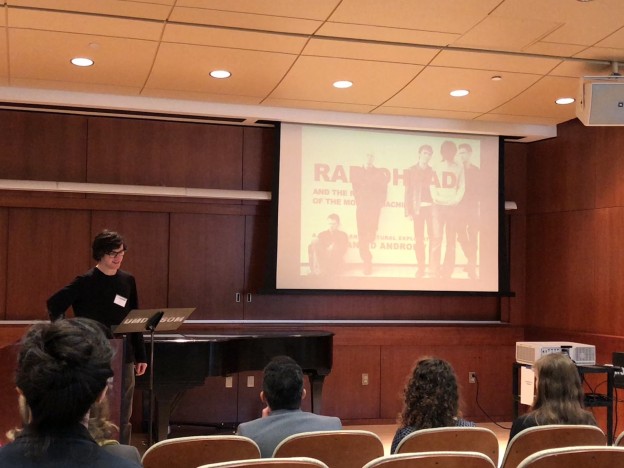On Saturday, March 24, Swarthmore Professor of Music Lei Ouyang Bryant and recent alumnus Tommy Neale ’17 presented selections of their respective scholarship at the Mid-Atlantic Chapter of the Society for Ethnomusicology’s annual conference in College Park, Maryland. Neale’s conference presentation consisted of a condensed version of the senior comprehensive paper that he presented to the music faculty for evaluation last semester. The topic of his paper is a music theoretical, historical, and cultural analysis of “Paranoid Android,” the lead single from Radiohead’s third studio album, OK Computer.
After reading his paper and listening to his presentation, Professor Bryant realized that Tommy’s research would be a good candidate for a conference presentation. She said, “I was really impressed with his multi-faceted examination of Radiohead. In his paper, he rigorously investigates the band, their music, and the particular historical and cultural moment of the album. Tommy has a wonderfully analytical mind and is really engaging in both writing and public speaking.” But the process of preparing his comprehensive for a conference presentation has not been without its challenges. Neale was tasked with condensing his 36-page thesis into a 10-page document and 20-minute presentation, that still somehow preserves his original points. Out of necessity, his presentation eschewed some of the finer music theoretical details that were contained in his original thesis, and focused mainly on the relationship between instrumentation, timbre, and ethnomusicology.
Both the process of writing his comprehensive and the subject matter of “Paranoid Android” were extremely important to Neale. He calls the initial process of writing his comprehensive as “tremendously worth doing” but also “very difficult” saying, “doing comps changed me.” “Paranoid Android” was “very formative” for Neale as a young listener, and he acknowledges the tremendous influence Radiohead has had on his own songwriting process. The process of sustained scholarship on a single topic is certainly a Herculean task, especially when the topic of one’s scholarship is a piece of art that holds such personal significance. The subject matter of “Paranoid Android” particularly resonates with Neale, especially given his experiences at Swarthmore. He describes Swarthmore as a “hyper-anxious place,” and says that the only way he has been able to keep his anxiety under control is by “going totally low tech…keep(ing) the stimulation really low.” “Paranoid Android,” written in the early days of the Internet Age, provides for Neale a distillation of this fear of sensory overload. “The main point of Radiohead,” he says, “is sort of turning the soundscape of modernity on itself critically.” In a world that can often be hyper-stimulating, Radiohead has provided for Neale a blueprint for survival.
He cites “the allure of doing something totally sideways…something very, very non-classical” for his senior comprehensive as one of his reasons in selecting “Paranoid Android.” But he is also quick to mention that his primary motivation was his love of Radiohead: “I think the reason that I loved them before is the reason I did comps, is the reason I still love them now.” But when asked how this process of scholarship has informed his conception of the song, Neale wryly chuckles. “In the end,” he says, “the research gets so far away from why you loved the song in the first place.” He says he is taking six months off from even listening to “Paranoid Android” again, perhaps to give his brain time to rest.
Rachel Hottle ’18
